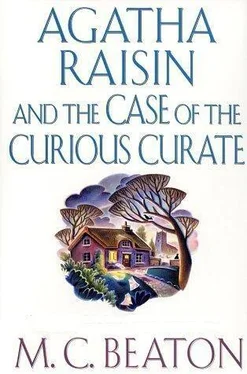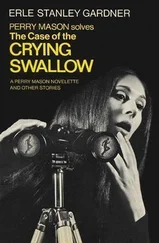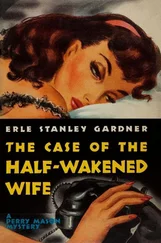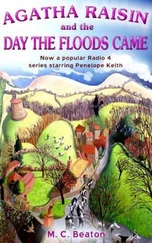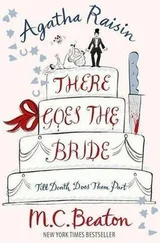M.C. Beaton - The Case of the Curious Curate
Здесь есть возможность читать онлайн «M.C. Beaton - The Case of the Curious Curate» весь текст электронной книги совершенно бесплатно (целиком полную версию без сокращений). В некоторых случаях можно слушать аудио, скачать через торрент в формате fb2 и присутствует краткое содержание. Жанр: Старинная литература, на английском языке. Описание произведения, (предисловие) а так же отзывы посетителей доступны на портале библиотеки ЛибКат.
- Название:The Case of the Curious Curate
- Автор:
- Жанр:
- Год:неизвестен
- ISBN:нет данных
- Рейтинг книги:5 / 5. Голосов: 1
-
Избранное:Добавить в избранное
- Отзывы:
-
Ваша оценка:
- 100
- 1
- 2
- 3
- 4
- 5
The Case of the Curious Curate: краткое содержание, описание и аннотация
Предлагаем к чтению аннотацию, описание, краткое содержание или предисловие (зависит от того, что написал сам автор книги «The Case of the Curious Curate»). Если вы не нашли необходимую информацию о книге — напишите в комментариях, мы постараемся отыскать её.
The Case of the Curious Curate — читать онлайн бесплатно полную книгу (весь текст) целиком
Ниже представлен текст книги, разбитый по страницам. Система сохранения места последней прочитанной страницы, позволяет с удобством читать онлайн бесплатно книгу «The Case of the Curious Curate», без необходимости каждый раз заново искать на чём Вы остановились. Поставьте закладку, и сможете в любой момент перейти на страницу, на которой закончили чтение.
Интервал:
Закладка:
The vicar arrived and peered at them curiously. He had what Agatha always thought of as a Church of England face: weak eyes behind thick glasses, sparse grey hair, grey skin, a bulbous nose and a fleshy mouth with thick pale lips.
“What do you want to see me about?” he asked. His voice was beautiful, the old Oxford accent, so pleasant to listen to that it sounds like no accent at all.
“I am Agatha Raisin and this is John Armitage. We both live in Carsely and are friends of the vicar there, Mr. Alfred Bloxby.”
“Oh, dear.” His face creased up in distress. “I heard about that dreadful murder on the news this morning. Terrible, terrible. How do you do. I am Fred Lancing. Do come in.”
He led them into the study, a shabby book-lined room. “I should really take you through to the sitting-room,” he said apologetically, “but I only really use this room and the others are rather damp and dusty. Would you like tea?”
“Yes, please,” said Agatha.
He opened the door of the study and shouted, “Mrs. Buggy!”
“What yer want?” came the answering shout.
“Tea for three.”
“Think I’ve got nothing better ter do?”
“Just do it!” shouted the vicar, turning pink.
He came back and sat down behind his desk. Agatha and John sat side by side on an old black horsehair sofa. “It was those evening classes on feminism,” he sighed. “Mrs. Buggy was much taken with them. She has regarded me as a tyrant ever since. How can I help you? Poor Tristan.”
Agatha outlined what had happened and said they were afraid that the police suspected Mr. Bloxby and she and John wanted to help to clear his name.
“The police called on me yesterday evening,” said the vicar mildly. “But I really couldn’t tell them anything much.”
“Did Tristan really get beaten up by a gang and have a nervous breakdown?” asked Agatha.
“I gather that is what he said.”
At that moment, the door crashed open and Mrs. Buggy entered with three cups of milky tea on a tray, which she crashed down on the vicar’s desk.
“No biscuits,” she snarled on her road out.
“I do hate bossy women,” murmured the vicar.
“I do so agree with you,” said John, flashing a look at Agatha.
“I did not know the vicar of Carsely – Mr. Bloxby, did you say? – was under suspicion.”
“I’m afraid so,” said Agatha. “Please tell us the truth about Tristan Delon. It could help. Someone murdered him and it could be someone from his past.”
The vicar stood up and handed each of them a cup of tea before retreating behind his desk.
“I am wondering what to tell you,” he said. “You see, if I tell you more than I have told the police, they will be very angry.”
“I am a private detective,” said Agatha. “I will not tell the police anything you say. I promise.”
“I, I, I,” murmured John, and Agatha threw him a fulminating look.
“De mortuis…” said the vicar. “I always think it is cruel to speak ill of the dead.”
“But surely it is necessary if it can help bring justice to the living. I gather Tristan was gay,” said John. Agatha stared at him in amazement.
“I believe so,” said Mr. Lancing. “There are so many temptations in town for a young man.”
“What temptations?” demanded Agatha sharply.
“He bragged about having a rich businessman as a friend and showed off a gold Rolex. But his homosexuality was not the problem. He should really have gone on the stage. He was very flamboyant in the pulpit. He charmed the parishioners – at first.”
“And then what happened?” asked John.
“He seemed to become bored after he had been with me for a few weeks. It was then he developed a, well, nasty streak. He would find out some parishioner’s vulnerable point and lean on it, if you know what I mean.”
“Blackmail?” demanded Agatha eagerly.
“No, no. Just…well, to put it in one word…spite.”
“Do you know the name of this businessman?” asked John.
There was a long silence, and then the vicar said, “No, although he bragged, he was very secretive about the details.”
He does know who it is, thought John.
Agatha sat forward on the sofa, her bear like eyes glistening. “So he didn’t have a nervous breakdown. He didn’t get beaten up.”
“He did get beaten up.”
“Because of his boys’ club?”
“He didn’t have a boys’ club. He appeared very frightened, however. He said he had to get away. He seemed to become quite demented. He was also very penitent and said he wanted to make a new start. I made inquiries and hit on the idea of removing him to a quiet country village. He had done nothing criminal, you see. And he did seem determined to become a better person.”
“Did he have any particular friend in the parish?”
“He did have one, Sol MacGuire, a builder. He lives over the shops on Briory Road. Number sixteen. It’s just around the corner if you turn left when you leave the vicarage.”
Agatha rounded on John as soon as they had left the vicarage. “How did you know he was gay?”
“I didn’t. It was just a wild guess.”
“Humph!”
“And I’ll bet he knows the name of that businessman.”
“He wouldn’t lie.”
“Because he’s a vicar? Come on , Agatha. You can be surprisingly naïve at times.”
“I don’t believe you,” said Agatha furiously.
They walked in silence round the corner to Briory Road. It was a shabbier street with smaller houses. Number 16 had an excuse for a front garden: a sagging privet hedge, a broken bicycle, rank grass and weeds.
No one answered their knock. They tried the neighbours and were told he was probably out working but that he usually came home around six in the evening.
“Four hours to kill,” said John, looking at his watch. “But we haven’t eaten anything. Let’s find a pub.”
They found one out in the main road where traffic shimmered in the heat. John pushed open the door and they walked into the gloom. It was fairly empty. It was an old–fashioned London pub which had not yet been “bistro-fied” like many others. Sunlight shone dimly through the dusty windows. Fruit machines winked and blinked. But at least there was no pipe-in Muzak. The landlord, a thin, sour man, said lunches were over but that he could make them some sandwiches. They ordered ham sandwiches and beer and when their order arrived, retreated to a corner table.
“At least we’re a bit ahead of the police,” said Agatha.
“Only a bit ahead. They’ll be back again sometime to ask the vicar more questions, and having told us, he’ll probably now tell them.”
“Do you really think so? He might not want to tell them now and let them know he was withholding informations in the first place.”
“Maybe. These sandwiches are awful. I haven’t had pub sandwiches like these in years. The ham is slimy and the bread’s dry.”
“Keeping up the good old English pub traditions,” said Agatha gloomily.
“This news about the rich man is interesting, though,” said John. “I mean, if he’s really someone important, he might have wanted to get rid of Tristan. Maybe Tristan was blackmailing him.”
“We forgot to ask how long it was between Tristan leaving New Cross and Tristan arriving in Carsely.”
“How would that help?”
“If it was a long period, he might not have that much left in his bank account. You see, he wasn’t in Carsely long enough to fleece anyone to any significant degree. I think he liked to spend money on himself. Whatever he had got, he might have dissipated so his bank account won’t give much of a clue.”
“It will,” said John, “if it shows cheques from any of the villagers, or from this businessman, whoever he is.”
Читать дальшеИнтервал:
Закладка:
Похожие книги на «The Case of the Curious Curate»
Представляем Вашему вниманию похожие книги на «The Case of the Curious Curate» списком для выбора. Мы отобрали схожую по названию и смыслу литературу в надежде предоставить читателям больше вариантов отыскать новые, интересные, ещё непрочитанные произведения.
Обсуждение, отзывы о книге «The Case of the Curious Curate» и просто собственные мнения читателей. Оставьте ваши комментарии, напишите, что Вы думаете о произведении, его смысле или главных героях. Укажите что конкретно понравилось, а что нет, и почему Вы так считаете.
